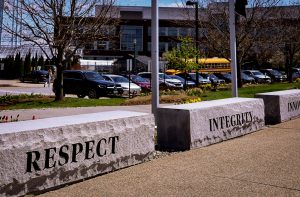Liberal arts majors supply valuable skills for success
November 10, 2017
To the Editor:
In a recent edition of the Cynic, sophomore English major Jacob Potts published an eloquent opinion piece fighting back against the flack humanities majors often take from peers convinced that their degrees are unlikely to lead to well-paying jobs.
When people hear Mr. Potts say he is an English major, he reports, “they hear, ‘I’m a fool who wants to be in debt for the rest of my life” (“Humanities students fight stigmas,” Sept. 26).
Mr. Potts makes two main points in response to the scorn he detects in others who hear he is an English major.
Most importantly, he asserts that his goal “is not to be wealthy” but “to do fulfilling work that will make me proud.”
He also points out that English majors develop many skills highly desired by employers—“written and oral communications, persuasion, creativity, critical thinking, research and editing”—the very skills in fact that employers in a wide range of professions say they find most lacking in recent college graduates.
As chair of the English department, I want to elaborate briefly on both points.
First, as I think many of my faculty colleagues would agree, virtually any major within the liberal arts—whether in the arts, the humanities, the social sciences, or the sciences—can lead to virtually any profession.
That is an argument, of course, for following your passion as an undergraduate, as Jacob Potts is doing. You’ll have more fun, you’ll be more successful, and you’ll be prepared for many possible futures.
English majors, for example, are highly sought after by law schools and medical schools.
I was chatting recently with perhaps UVM’s most famed heart surgeon, professor of surgery Frank Ittleman, who told me that he believed his undergraduate English major was the best preparation he could have had for his career in medicine.
In this issue of the Cynic, a full-page ad about the prospects in life for English majors features, among others, Dr. Harold Varmus, former director of the National Institutes of Health and the National Cancer Institute and winner of the 1989 Nobel Prize in Medicine.
Jacob Potts asks readers to consider what “life would be like if the world was populated solely by engineers, physicians, and computer scientists.”
But in cases like Dr. Ittleman’s and Dr. Varmus’s, the implied dichotomy between the humanities and sciences may well be a false one.
You’ll find on page three of this week’s paper other famous English majors, ranging from Steven Spielberg to Jack Ma, founder and CEO of the largest retail firm in the world, Alibaba.
And you’ll also find there, closer to home, a list of what actual recent UVM graduates in English are doing: working for Saturday Night Live, CNN, and the Genetic Literacy Project, among other high-profile employers, teaching in schools, colleges, and universities, and attending top graduate schools like New York University and Harvard University.
Bottom line: follow your heart and your passions in your studies.
Doing so will lead to treasures of the spirit and the intellect and will open many paths to success in many lines of work—some of them no doubt difficult and challenging, but for all of which you will be well prepared.
And, Jacob Potts, thanks for a great opinion piece: you rock!
Dan Fogel
Professor and Chairperson
Department of English






